In the realm of organic chemistry, hydrocarbazole stands out as a crucial compound that serves as a building block for a variety of biologically active compounds. From pesticides like strychnine to anticancer drugs such as vinblastine and minovincine, the synthesis of hydrocarbazole is a key research topic that has the potential to revolutionize the field.
A research team led by Associate Professor Shinji Harada from Chiba University in Japan has been at the forefront of developing new synthesis methods for hydrocarbazole compounds. Their recent breakthrough involved utilizing indole-incorporated siloxydienes and rare earth catalysts to achieve complex hydrocarbazole compounds with tetrasubstituted carbons.
One of the main challenges faced by the research team was the low reactivity of siloxydiene substrates containing a substituent at the second carbon position of the indole ring. This reactivity issue is crucial for synthesizing hydrocarbazole compounds with tetrasubstituted carbons, such as Kopsinine, which have garnered significant interest in pharmacological research.
To address the reactivity challenge, Dr. Harada and his team developed a new technique that utilizes a lanthanide-based catalyst. This new catalyst not only allows for the synthesis of complex compounds with high purity but also enables the recycling of the catalyst, paving the way for sustainable chemical processes.
Improving Catalyst Efficiency
The researchers initially attempted to perform the Diels-Alder reaction using a chiral helical ytterbium catalyst but encountered low reactivity due to the methyl group present in the substrate. To enhance the catalyst’s Lewis acidity and create space around the central metal, they incorporated a triflimide salt to create a ytterbium triflimide catalyst. Subsequent modifications, including replacing ytterbium with holmium, led to a significant improvement in yield and enantioselectivity.
The research team successfully synthesized multiple complex hydrocarbazole compounds, including a tetracyclic compound with five chiral centers, showcasing the versatility of their technique. By studying the reaction mechanisms through experimental and computational methods, they have laid the groundwork for accelerating the development of new drugs that could impact various aspects of our lives, from medicine to the environment and food.
The research conducted by Dr. Harada and his team has the potential to shape the future of organic chemistry and pharmaceuticals. By creating complex hydrocarbazole compounds with remarkable efficiency and purity, they are not only advancing the field but also contributing to the development of sustainable chemical processes that could improve people’s health and quality of life on a global scale.


Leave a Reply